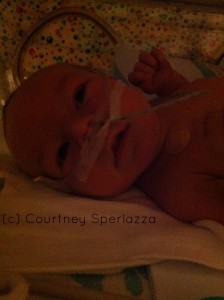“It’s green. Really green,” said my midwife just after my water broke. The amniotic fluid was meconium-stained, and my mind went to the worst.
“So he’ll end up with some in his lungs?” I asked.
She threw out a percentage of babies who aspirate meconium, and I don’t recall the exact figure, but it was in the 20s. And she said of those, not all babies have problems from meconium aspiration.
That was enough to keep me from worrying. After all, I had work to do.
My midwife told me that she would have the neonatal team at the ready, just in case. Of course, I wasn’t focusing on much of anything at that point, except getting the baby earthside.
When my sweet boy was born, there was no cry. Nobody in the room smiled. Instead, there was a mix of hesitation and silent commotion. Everyone faced the warming table, where the neonatal team was hard at work trying to stabilize him.
The nurse came over to tell me that I could hold him briefly, but that he would need to go to the NICU right away. When she handed him to me, I held him for just a moment, gave him a kiss and willingly handed him back. He was struggling, and I didn’t want to waste another second. I wanted him to go wherever he needed to go to get better.
We later found out that my baby had a collapsed lung and had to stay in the isolette under oxygen therapy. I couldn’t hold him for three days and I couldn’t nurse him for four.
I worried that the separation would tamper with our biological bonding mechanisms. I wondered whether he felt secure and comforted. I wondered how this would affect my hormones and my milk supply. I worried that he felt abandoned.
I wondered if it hurt to have a hole in your lung.
For my baby’s first few days, I would sit near his isolette, occasionally reaching in to trace his little fingers with mine.
On the third day, the nurse told me that the doctor thought that kangaroo care (holding the baby skin-to-skin) would help him make some strides toward recovery. I tried hard to keep it cool, but I failed hard – I burst into tears right then and there. I had waited so long to hold my baby boy.
When the nurse handed him to me for the first time, I felt that rush of love you hear about – that same surge of emotion that I felt right after the birth of my first two babies when the nurses handed them to me.
All this time, I thought I had missed my window. But it was there, waiting for our little reunion.
There was no doubt that that feeling was our bonding hormones at work. I knew because it was familiar. I had felt that before with my first two babies and it is an indescribable feeling that cannot be replicated. As for more concrete evidence that the hormones were in working order, I had been pumping 0.2 or 0.3 mL of colostrum at a time (drops!) and after I held my boy I filled a full 3 mL.
The next day, the doctor suggested I try to nurse him. I expected a learning curve, as he had gone days without learning to breastfeed instead of initiating within minutes of birth. But I was wrong. The little champ latched like a pro right away.
My sweet boy is now off of the growth charts, strong as a bull and he’s the happiest and most loving baby I have ever seen. All you have to do is make eye contact with him and he’ll give you a big cheeky toothless smile that just puts you deeper under his spell. And I have every reason to believe that we have established a secure attachment that we will build upon for a lifetime.
I hope I’m not diminishing the importance of bonding immediately after birth. Mother and baby are primed for bonding during this time and should make the most of those short minutes and hours if they can. Just know that if you have to wait a few hours or days to begin getting to know each other, it will be okay.

